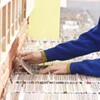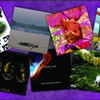Published April 11, 2006 at 12:23 p.m.
Here's some advice for aspiring indie rockers: Be careful what you wish for. Success always comes at a price, maybe especially when it seems to occur overnight. One moment, savvy hipsters are obsessing over your every movement; the next, you're yesterday's news.
Electrifying Montréal quartet Wolf Parade have yet to experience the backlash that often accompanies acclaim. But they've certainly felt the pressure.
At this time last year, the hype surrounding the group was at its peak. Some of it was due to their association with Modest Mouse leader Isaac Brock, who got them signed to Seattle's legendary Sub Pop Records. And living in Montréal no doubt increased the band's visibility; the city is currently home to one of the most vital music scenes in North America. Then there's their friendship with the reigning kings of indie rock, Arcade Fire, who brought Wolf Parade on a 2005 world tour. Interestingly, most of the attention came before their debut, Apologies to the Queen Mary, had even been released.
But there's more to Wolf Parade than runaway publicity. Their idiosyncratic music bridges the gap between twitchy post-punk and the more expansive sound of '70s art-rockers such as David Bowie. And they certainly have teeth. While many indie groups trade in pretty, introspective ditties, Wolf Parade's music has a feral intensity befitting their lupine moniker.
Seven Days recently chatted with the group's 28-year-old keyboardist/vocalist Spencer Klug, in advance of the band's upcoming appearance at the Higher Ground Ballroom.
SEVEN DAYS: First of all, let me apologize if I ask questions you've heard a thousand times already. Are you sick of interviews yet?
SPENCER KLUG: We haven't actually done any in a while. There were a bunch around the release of the record, but it's been pretty quiet since Christmas. So I'm fresh and good to go.
SD: There's an echo chamber among music journalists, who often just repeat what the last person wrote. What was it like being caught in the hype-loop?
SK: It's pretty disorienting. But we knew part of what was going on was due to all of these other variables, which have nothing to do with the music. We did our best not to let it affect us. We could only try to justify the attention by playing well.
SD: I haven't seen you guys live yet, but even jaded music critics are blown away by your performances.
SK: Well, I hope so -- I dunno. We'll see on this next tour. It's been a while since we've played together.
SD: Now that the band is internationally acclaimed, do you still have day jobs?
SK: Sort of. I mean, yes and no. We're sort of all doing what we did before -- I've always worked odd jobs around the city anyway. I'm not right now, because we have to go back out pretty soon. Now the band is generating enough that we can work our other sources of income around it. I know we're lucky.
SD: People have made a big deal about Isaac Brock discovering Wolf Parade. He also produced your debut. What did he bring to the table?
SK: His contributions were fairly substantial. Isaac's a good guy. I had never worked with a producer before, so I didn't know what to expect. It's a pretty ambiguous title, anyway. I've heard there are producers that kind of wander in every couple of days and give some suggestions, then walk out. But Isaac was there the whole time. He was like an extra brain. We'd work on the songs, and he'd offer a nice, objective viewpoint -- things we maybe wouldn't have thought about otherwise. He was also a big part of the sound engineering. I think he did a really good job.
SD: Hype aside, Apologies is a solid rock record. Did you feel any outside pressure while you were recording?
SK: Yeah, but I don't think we did anything differently than we normally would've. And if there wasn't that hype, then there wouldn't be the label, and we wouldn't have had the money to go to Portland [Oregon] to record. But when you think about the fact that it's for an audience, suddenly it's outside your own head. I don't think it changed anything. Yet it's impossible to say, because that was the world we were in. Isaac was good about it, though. He'd say, "Don't fucking think about it -- just concentrate on making a great record."
SD: What's the approach gonna be next time around?
SK: There's a tentative plan to record here in Montréal with some gear of ours. We're going to build a little mock studio and just poke at it over the summer. We want to take a different approach than last time, when we had to make a record in three weeks. We can let the songs grow more organically, rather than having everything already written.
SD: That often leads to a band's most interesting work.
SK: It'll be fun, but then again, there's the pressure of the second record. It's kind of a killer: If you do the same thing, people will crucify you, even though they loved the first one. But if you stray too far, they'll crucify you for that.
SD: Is there any pressure from Sub Pop to hurry up and get the thing done?
SK: No, not at all. They don't care!
SD: There aren't a lot of rock keyboardists that are still considered cool. Do you have any influences?
SK: No, I really don't. I played piano as a kid and I know how to play the instrument. When we formed, there were only three of us -- no bass. So I immediately began playing keyboards to fill space. It's fun, but I don't take it too seriously. And I don't play standing up, mostly because of Paul Shaffer.
SD: As long as you don't play a "keytar," you're probably all set.
SK: Those are pretty cool, though!
SD: The tunes you compose fit seamlessly with [co-singer-songwriter] Dan Boeckner's. Is this a coincidence, or something you had to work at?
SK: It's really a product of the whole band. If Dan and I were to sit in front of you and play with acoustic guitars, you'd see the writing is quite different. But when you drape it with the same decorations, things tend to unify. The other members create the cohesion.
SD: You're very soft-spoken, but when you sing, you belt it out. Where does that come from?
SK: I don't know . . . It's the only way I can hit the notes!
SD: Your music has both a haunted quality and a kind of agitation. What's the source?
SK: Well, Dan and I are both agitated people.
SD: What agitates you?
SK: Um, each other? I guess it's why we were drawn to playing together to begin with. But [writing music] seems kind of shallow and selfish sometimes. It's always your own thoughts about your own relationships, your own alienation, or whatever. It feels kind of . . . petty.
SD: But there's a universal aspect to it as well. I think if it's coming from an honest place, then there's no shame.
SK: Well, we do try.
More By This Author
Speaking of...
-

Two Local Band Directors March in the Macy's Parade
Nov 22, 2023 -

Before a Burlington Show, the Wood Brothers Get Back to Basics
Oct 26, 2023 -

After a Half-Century of Leading Local Ensembles, Steven and Kathy Light Prepare a Musical Farewell
May 3, 2023 -

Double E 2023 Summer Concert Series Kicks Off With the Wailers
Mar 17, 2023 -

UVM’s New School of the Arts Gathers Many Creative Disciplines Under One Roof
Sep 14, 2022 - More »
Comments
Comments are closed.
From 2014-2020, Seven Days allowed readers to comment on all stories posted on our website. While we've appreciated the suggestions and insights, right now Seven Days is prioritizing our core mission — producing high-quality, responsible local journalism — over moderating online debates between readers.
To criticize, correct or praise our reporting, please send us a letter to the editor or send us a tip. We’ll check it out and report the results.
Online comments may return when we have better tech tools for managing them. Thanks for reading.












































